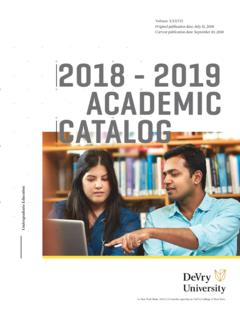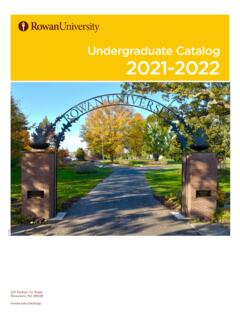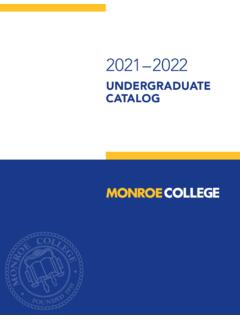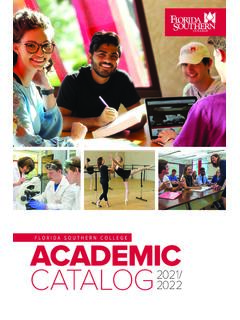Transcription of Science, Technology, and Society - MIT
1 SCIENCE, TECHNOLOGY, AND Society . SCIENCE, TECHNOLOGY, AND Society Intersections: Science, Technology, and the World At least one STS Tier I subject ( academics/ undergraduate /tier-i-subjects) , in addition to The Program in Science, Technology, and Society (STS) focuses on the ways in which scienti c, technological, and social factors interact to shape modern life. The program brings together humanists, At least one STS Tier II subject ( social scientists, engineers, and natural scientists, all committed academics/ undergraduate /tier-ii-subjects ). to transcending the boundaries of their disciplines in a joint search Four other STS subjects for new insights and new ways of reaching science and engineering Four subjects related to the historical and social study of science students.
2 The goal of the program is to set up a forum to explore and technology the relationship between what scientists and engineers do and the undergraduate Thesis Tutorial constraints, needs, and responses of Society . undergraduate Thesis Located in a major university where most people study science If a student's other major also requires a thesis, students may and engineering, STS is dedicated to understanding the context of coordinate their thesis e ort, pending approval of undergraduate science and engineering. o cers in both majors. Further details on the requirements of the STS program may be obtained from the STS undergraduate academic o cer and the STS academic administrator.
3 undergraduate Study MIT students are increasingly seeking to understand the social Joint Degree Programs and historical contexts in which they will work and the social Students who wish to integrate studies in STS and science or consequences of what they will do in their professional careers. engineering in the context of a single degree should consider this STS subjects help them think realistically and creatively about the program. It leads to one degree, either a Bachelor of science in intellectual, moral, political, and social issues raised by the rapid Humanities and Science or a Bachelor of science in Humanities and growth of science and technology in the 20th century and beyond.
4 Engineering. The STS requirement for either degree is 9 subjects as follows: STS contributes to undergraduate education at MIT in several ways. It o ers general subjects to introduce students to broad social Intersections: Science, Technology, and the World and intellectual perspectives on science and engineering elds. At least one STS Tier I subject ( It also o ers more specialized subjects in the history of science academics/ undergraduate /tier-i-subjects) , in addition to and technology and in social and cultural studies of science and technology. Within each of these categories, students can choose At least one STS Tier II subject ( both introductory and more advanced subjects.)
5 Academics/ undergraduate /tier-ii-subjects ). Four other STS subjects STS as a Second Major undergraduate Thesis Tutorial Students who wish to integrate their professional study of engineering or science with a rigorous treatment of its relation undergraduate Thesis to social and historical forces may pursue STS as a second major Consult the 21E ( ( engineering-course-21e) and 21S ( sts) in cooperation with the Schools of Engineering and Science. The charts/humanities-science-course-21s) degree charts for details object of this program is to give those students the full technical on the requirements for these joint degrees.
6 Further details may be and scienti c education provided by a science or engineering major, obtained from the SHASS Dean's O ce Room balanced with intensive study of the historical and social contexts 4-240, and the STS academic administrator. of science and technology. Double major applications from students in other Schools ( , Architecture and Planning; Management;. Minor in Science, Technology, and Society Humanities, Arts, and Social sciences ) will be considered on a case- The goal of the minor program is to give students a broad social by-case basis. perspective on the elds of engineering and science: how they have Students in the double major program must complete all the evolved and how they t into the wider context of Society , culture, requirements of both majors.
7 The STS requirements include 13 politics, and values. subjects as follows: The Minor in Science, Technology, and Society consists of six STS. subjects, including , at least one additional subject from the Tier I list, and at least one subject from the Tier II list. Science, Technology, and Society | 3. SCIENCE, TECHNOLOGY, AND Society . Tier I Introduction to Science, Technology, 12. Intersections: Science, Technology, 12 and Society 1. and the World Students are encouraged to take Designing Empirical Select one of the following: 12. Research in the Social sciences or Ethnographic Research Technology in American History Methods at some point in their program.
8 To ful ll the remaining Finance and Society subject requirement, students choose from among several Ancient Greeks to Modern Geeks: A departmental seminars designed to o er more in-depth study of History of science particular topics. They may also take subjects o ered by other MIT. [J] Data and Society departments and through cross-registration with Harvard. [J] Bioethics Upon the satisfactory completion of general examinations in the Technology and Experience third year, students proceed to the writing of a dissertation proposal Evolution and Society and dissertation, usually with the assistance of a multidisciplinary Engineering Life: Biotechnology and advisory committee.
9 Society Students from any academic discipline are invited to apply to the Science in Action: Technologies and doctoral program. Controversies in Everyday Life Tier II. 2 Inquiries Select one subject from the list of Tier II subjects 9-12 Visit the website for additional information about the HASTS. Electives graduate program ( ) or contact the STS. Select three additional subjects from among Tiers I 27-36 academic administrator ( ), Room and II E51-163, 617-253-9759. Total Units 60-72. 1. Substitution with a similar subject may be permitted by petition to the STS Faculty and Teaching Sta . undergraduate O cer. 2 Deborah K.
10 Fitzgerald, PhD. See list of Tier II subjects ( Leverett Howell Cutten '07 and William King Cutten '39 Professor of undergraduate /tier-ii-subjects). the History of Technology Interim Head, Program in Science, Technology, and Society Graduate Study Professors In collaboration, STS, the History Faculty, and the Anthropology Kate Brown, PhD. Program o er a doctoral program in History, Anthropology, and Thomas M. Siebel Distinguished Professor in the History of science Science, Technology, and Society (HASTS). Professor of science , Technology, and Society The objective of the program is to develop advanced competence Michael M.








